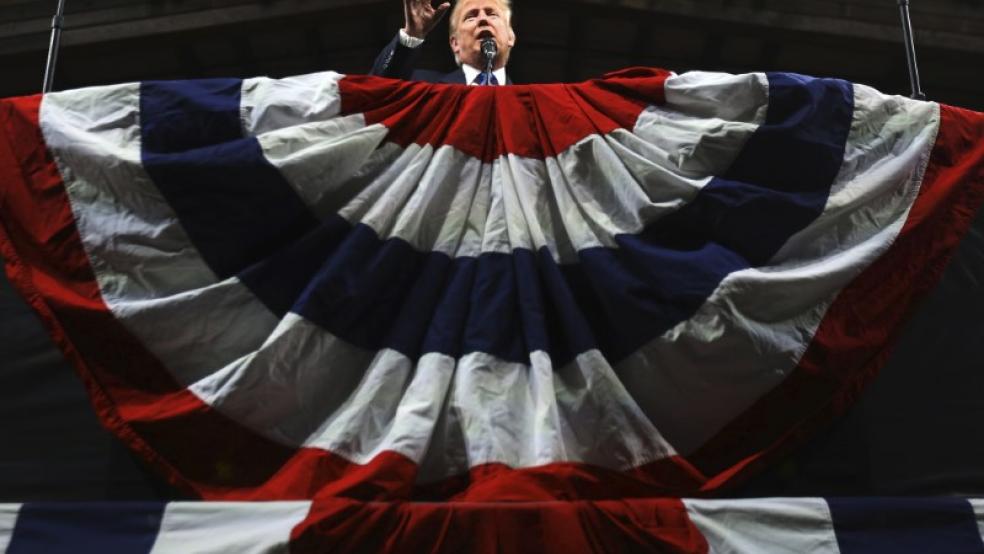“Tonight is a turning point,” an exultant Ted Cruz declared in his victory speech on Tuesday night after a blowout win in the Wisconsin primary over Donald Trump. “Tonight, Wisconsin has lit a candle guiding the way forward,” Cruz continued. “Tonight is about unity, and tonight is about hope.”
Cruz can be forgiven for his enthusiasm, but the race is far from over, and hope and unity for the GOP are still a long way off – perhaps months off, and that’s if Cruz gets lucky. The race in Wisconsin shifted delegates expected to land in Trump’s column to Cruz, but only a relative pittance in the larger context of convention math. Trump still has a big lead, and while his path to an outright nomination just darkened somewhat, it still looks brighter than the path ahead for Cruz.
Related: Trump Voters—Cut Trump Loose Se He Can Shake Up the Country
In order to win the GOP’s presidential nomination on the first ballot at the convention in Cleveland, a candidate has to win a majority of the delegates – 1,237 if all vote on the first round. Most of the delegates will come to Cleveland bound to a particular candidate for the initial vote, although a significant number will be free agents. Trump will have to win roughly 62 percent of the remaining delegates in order to reach that number and keep the Republican convention from getting to a second ballot, or convince enough of the free agents to make up the difference.
That’s a tall order, but Cruz would have to win around 90 percent of the delegates left in the upcoming primaries to win the nomination on the first ballot. With New York the next big primary event and Trump maintaining polling leads of around 30 points, any possibility of Cruz achieving “unity” before a contested convention is all but theoretical.
Still, Cruz could be correct that the Wisconsin primary provided a turning point in the GOP primaries – if unbound delegates and voters in subsequent GOP contests paid attention to the entire arc of the primary fight in the Badger State. It provides not just a look at shifting momentum in the race, but also a cautionary tale for those considering Trump as the Republican Party leader in the general election. The collapse of the Trump campaign in Wisconsin should give significant pause to that impulse.
Related: Here's Who Wall Street Thinks Will Win in November
Less than eight weeks ago, polling showed Wisconsin solidly as Trump territory. Polling in January from the Marquette Law School, generally considered the gold standard in Wisconsin, put Trump up by six points over Marco Rubio and eight points over Cruz, 24/18/16. Four weeks later, the same pollster put Trump up ten points over Rubio and eleven over Cruz, 30/20/19, as the first Super Tuesday approached at the beginning of March. Trump dominated both the March 1 and March 15th Super Tuesdays, laying claim to significant momentum before the two-week open schedule prior to Wisconsin’s primary.
What happened to Trump in those two weeks? He repeatedly shot himself in the foot with intemperate remarks and strange arguments. He attacked Scott Walker for not cooperating with Democrats to raise taxes and spending in an attempt to win Republican votes. He then fumbled an abortion question in a manner not seen since Todd Akin, saying he would punish women who had an abortion, prompting pro-life groups around the country to denounce Trump. He ended up retreating from both, an unusual occurrence for Trump and one that at least implicitly acknowledged serious errors.
Exit polling showed just how damaging those errors turned out to be. Cruz not only edged Trump among independents (40/39), but also defeated Trump by 22 points (54/32) among self-identified Republican voters in Wisconsin’s open primary. Cruz won both men and women by double digits, and won every education demographic. Trump’s big advantage among white working-class voters evaporated, with Cruz winning every income demo. Among evangelical Christians, where Trump had been competitive until his abortion fumble, Cruz won 53 percent -- and Trump only got 34 percent.
Related: Here’s the Map That Shows Why the GOP Is Freaking Out About Trump
It only took two weeks for Trump to demolish what looked like a lock in Wisconsin. His campaign spent weeks in Wisconsin, and yet did nothing to learn what voters there think or what they want in a nominee. Trump’s fortnight was a disaster of his own making, and a glimpse of the high risk a Trump general election candidacy would provide the GOP.
That risk might be tolerable if Trump gave an indication that he recognized the problem. In his statement after the loss, however, Trump instead railed about having to endure an “onslaught” of negative advertising and hostile media. Just what does Trump expect to find in the general election if he wins the nomination? If Trump folds only because of negative advertising and hostile media, that alone should have unbound delegates thinking twice about a Trump nomination, especially with Hillary Clinton and a mainstream media already hostile to Republicans waiting after the conventions.
Trump’s spectacular collapse from 10 points up to a 16-point loss in just three weeks is lesson enough for Republicans. Loose cannons might hit their marks on occasion, but their recoil damages everyone in their proximity. If Republicans want to win the White House and hold the House and Senate, they need a nominee with much better aim and discipline. If the Wisconsin loss reminds delegates and the voters still left to participate of this truth, then it will be a turning point indeed.






